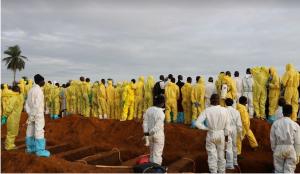Supporting the mental health needs of frontline responders
FREETOWN, October 18 2017 --- When the biggest natural disaster on record in Sierra Leone hit Freetown on 14 August, hundreds of staff and volunteers immediately joined in the response and relief efforts. The scale of the disaster challenged the authorities’ existing resources, particularly for search and rescue. “I played my part. Our contribution might not have made headlines in the media but it was a significant part of the process and I feel satisfied in myself to have supported these efforts,” says Dain Kay*, a volunteer grave digger in Waterloo village.
At the scenes of the mudslides and flash floods that killed over 500 people and displaced approximately 6000 others, volunteers played important roles in very many ways. According to Pieter Peters*, a resident of the downstream Kamayama community, rescuing people that were being washed away as well as recovering the dead from the gushing streams was frightening, but, he says, it had to be done. “We pulled both living and dead people from the flood waters in large numbers.”
The support of volunteers like Dain and Pieter was prominent at different levels of the response, as well as staff from government agencies and partners who worked hours beyond their usual routines. From search and rescue operations to management of bodies at the mortuary in the main referral hospital, Connaught; digging of over 500 graves and burying of those killed in the disaster, their role was crucial.
And, despite the fact that some of them had contributed to past national disaster responses such as the Ebola outbreak, many say they had never dealt with any single event as catastrophic or traumatic as this. For some frontline volunteers and staff, this work would test their emotional resilience.
“I was part of the burial team during the Ebola outbreak but taking part in the digging and burial of such a large number of people still haunts me,” says Dain. Dain and many other youths participated in the digging of hundreds of graves for the burial of the remains of the 500 people pulled from the rubble. He reports experiencing recurrent nightmares that nightly, take him back to the sights and smells of this experience.
Similar stories were also expressed by other volunteers as they narrated their experiences during recent workshops that were conducted through trained mental health staff, telling of flashbacks. Some had started drinking or using other substances – self-medicating - to relieve their stress.
“Frontline responders are not passive emotional bystanders when a disaster occurs and their needs should never be neglected in an emergency response,” explains Florence Baingana, Mental Health Specialist at the World Health Organization in Sierra Leone. “Understanding and addressing their immediate and long term psychological needs also enhances the quality and effectiveness of the services they can provide to others. So it is really an essential component of effective disaster management.”
Cognizant of the mental health issues that can emerge during emergencies, after the landslides the Ministry of Health and Sanitation with support from the World Health Organization and UK Aid quickly deployed Mental Health Nurses to provide critical psychological first aid and more intensive psychological and mental health support to survivors. Since September 2017, these services have been extended to ambulance drivers, grave diggers, and mortuary personnel.
Trainings and workshops aim to help them recognize and manage signs of mental distress, in themselves and in others, and ensure they know how to access mental health care services. Compassionate communication and psychological first aid trainings have also been provided to health workers in the affected areas.
“Through the trainings, the Ministry and partners have been working to tackle stigma and preconceived ideas people often have about mental health,” says Baingana. “This means making sure people know that it is normal to not be ok after experiencing traumatic events and when there is need, that they feel empowered to reach out for help.”
Such help and support services are available at Connaught and the 34 Military Hospitals in Freetown as well as through the 19 mental health nurses stationed at the district hospitals.
* Names have been changed to protect the privacy of interviewees



